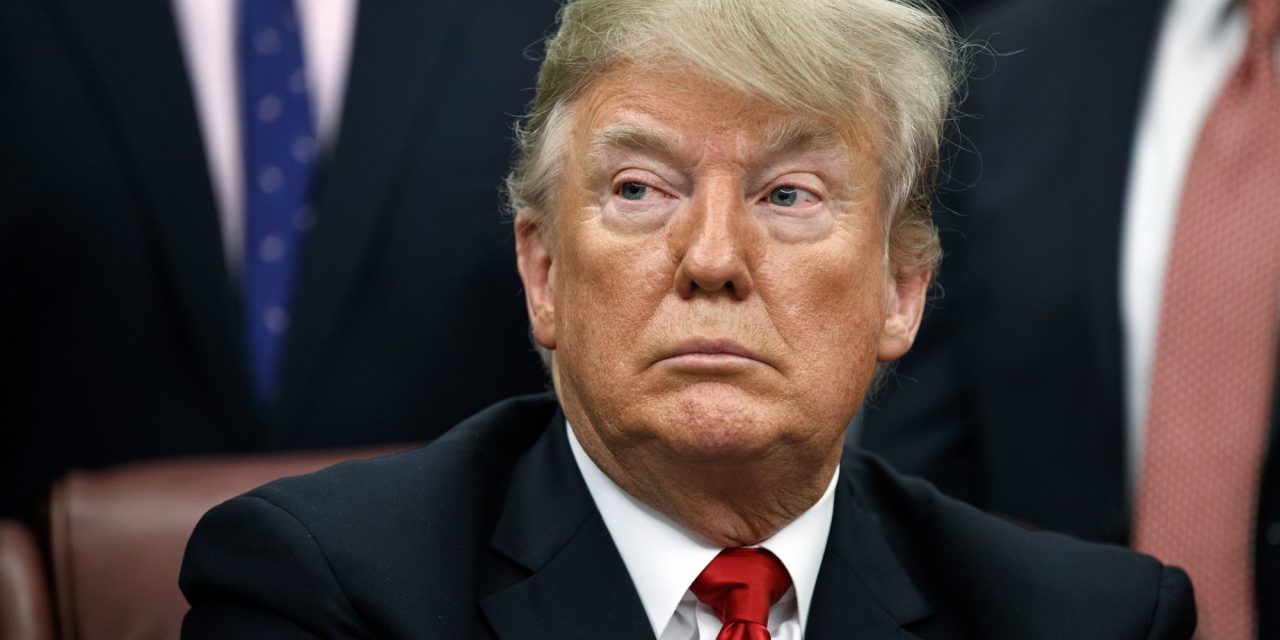Image Credits: Evan Vucci / AP.
We are going to hear more and more about Section 3 of the 14th Amendment because it will be used in an effort to keep Donald Trump off the ballot in the 2024 election. ABC News has a good primer on the issue, if you’re interested. Here are the basics. The 14th Amendment was adopted in 1868, in response to the unsuccessful Confederate rebellion against the United States of America. It’s primary purpose was to grant full citizenship and rights to blacks, but it also dealt with some cleanup from the Civil War. In particular, Section 4 dealt with honoring the debts we had incurred, which is relevant to defaulting on our debt today, and Section 3 set forth a ban on allowing certain Confederates to hold public office.
Section 3 Disqualification from Holding Office
No person shall be a Senator or Representative in Congress, or elector of President and Vice-President, or hold any office, civil or military, under the United States, or under any State, who, having previously taken an oath, as a member of Congress, or as an officer of the United States, or as a member of any State legislature, or as an executive or judicial officer of any State, to support the Constitution of the United States, shall have engaged in insurrection or rebellion against the same, or given aid or comfort to the enemies thereof. But Congress may by a vote of two-thirds of each House, remove such disability.
Later on, the rules were relaxed through an amnesty, but the language is still on the books and still part of our Constitution. If you ever held public office and later engaged in an insurrection or rebellion against the United States, you may not hold any future civil or military office. It has already been enforced once, in New Mexico, where Couy Griffin was removed by a judge as county commissioner for District 2 of Otero County because he participated in the January 6, 2021 riot at the Capitol. His participation was relatively minor. He scaled a barrier and entered a restricted area but he did not enter the Capitol building. He was eventually convicted of trespassing and acquitted of disorderly conduct. He was sentenced to “14 days in jail (that was satisfied by time served), a $3000 fine, 60 days of community service, and supervised release for a duration of one year.” Yet, this was enough under the 14th Amendment to cost him his job as a county commissioner and bar him from future service.
But that doesn’t end the debate. Florida Atlantic University political science professor Kevin Wagner explained the issue to ABC News:
“The challenge here is that the 14th Amendment isn’t necessarily self-executing. In other words, it doesn’t just automatically happen and there is some question about what it means to be engaged in insurrection or rebellion and how that is defined. The challenge for us is that historically, it hasn’t been well-defined,” Wagner, a professor at Florida Atlantic University, said.
“The question is about what is “participating in a rebellion or an insurrection.” There is dispute and people feel strongly what happened was essentially an insurrection — and it’s often referred to that way fairly regularly — but others have suggested that this was a protest that may have gotten out of hand — and may have even become criminal — but didn’t rise to a level of a rebellion or an insurrection. And the provision of the 14th Amendment really turns on how it is that we assess what happened,” he said.
One thing that is certain is that every Secretary of State or top state election official in the country will be petitioned to keep Trump off the ballot on the basis of Section Three. Citizens for Responsibility and Ethics in Washington (CREW) has already prepared a campaign for this purpose, and they’ll be joined by others including Free Speech For People, and even ordinary citizens. An interesting example comes from New Hampshire:
On Tuesday, Bryant “Corky” Messner, a lawyer who lives in New Hampshire, became the first person to announce concrete plans to [challenge Trump’s ballot access].
Messner was endorsed by Donald Trump when he ran for a New Hampshire’s U.S. Senate seat in 2020. Now, he says that as a veteran and a graduate of West Point, his civic duty compels him to try to keep Trump off the ballot.
“I really don’t view myself as turning on Trump, as odd as that sounds,” he told ABC News. “I love this country. I’ve served this country. I’ve taken an oath to this country. My sons are serving right now and I believe someone’s got to step up to defend the Constitution.”
At the first Republican debate in Milwaukee, which Trump did not attend, former Arkansas governor Asa Hutchinson said he would not support anyone who had been convicted of a “serious felony or who is disqualified under our Constitution,” referring to the 14th Amendment. Hutchinson was relying on an academic article recently published in the Pennsylvania Law Review (abstract here) written by Federalist Society members Profs. William Baude of the University of Chicago Law School and Michael Stokes Paulsen of University of St. Thomas School of Law. The professors conclude:
First, Section Three remains an enforceable part of the Constitution, not limited to the Civil War, and not effectively repealed by nineteenth century amnesty legislation. Second, Section Three is self-executing, operating as an immediate disqualification from office, without the need for additional action by Congress. It can and should be enforced by every official, state or federal, who judges qualifications. Third, to the extent of any conflict with prior constitutional rules, Section Three repeals, supersedes, or simply satisfies them. This includes the rules against bills of attainder or ex post facto laws, the Due Process Clause, and even the free speech principles of the First Amendment. Fourth, Section Three covers a broad range of conduct against the authority of the constitutional order, including many instances of indirect participation or support as “aid or comfort.” It covers a broad range of former offices, including the Presidency. And in particular, it disqualifies former President Donald Trump, and potentially many others, because of their participation in the attempted overthrow of the 2020 presidential election.
Now, if you are a hypothetical top state election official considering a ballot challenge to Trump on this basis, you can simply accept the reasoning and strike him from the ballot. Perhaps you can also seek guidance from your state Attorney General or state courts. It’s certain that if Trump is the Republican nominee, he will be kicked off at least some states’ ballots and have to appeal.
It would seem that the Supreme Court is likely to rule in Trump’s favor since he appointed three of its members and it has a 6-3 conservative majority, but I can’t think of a 2020 election-related case that Trump has won at the Supreme Court. It really will come down to two factors. First, can we consider the January 6 riot (or Trump’s general effort to remain in power despite losing) to be a rebellion or insurrection, and second, can we say that Trump at least gave aid and comfort to that rebellion?
The government has already attained multiple convictions on seditious conspiracy. Trump may soon be convicted in Atlanta of racketeering in an effort to steal an Electoral College victory. He could also be convicted in federal court of corruptly impeding and obstructing Congress and the certification of Joe Biden’s victory. There seems to be plenty of ammunition to argue both that a rebellion or insurrection occurred and that Trump was deeply involved. As the Georgia case demonstrates, the rebellion wasn’t restricted to the January 6 riot because it was just one part of a much larger multi-state months-long coup attempt. But even in a strict January 6 sense, Trump assembled the mob, whipped it into a frenzy, sent it to the Capitol and refused to call them off as they attacked, forcing Congress into hiding and causing death and massive property damage.
It’s pretty hard to maintain that this was all just a protest that got out of hand.
Am I predicting that there will be a majority on the Supreme Court to keep Trump off the ballot? No. I’m not even ready to predict that Trump will be the nominee.
But I wouldn’t completely rule out that the Supreme Court, if a time comes for them to decide, could see the merits in keeping Trump off the ballot. The case is strong and really up to their discretion. And Trump may not seem like an attractive option to Sam Alito and Clarence Thomas after they get a look at some post-conviction general election polls.







